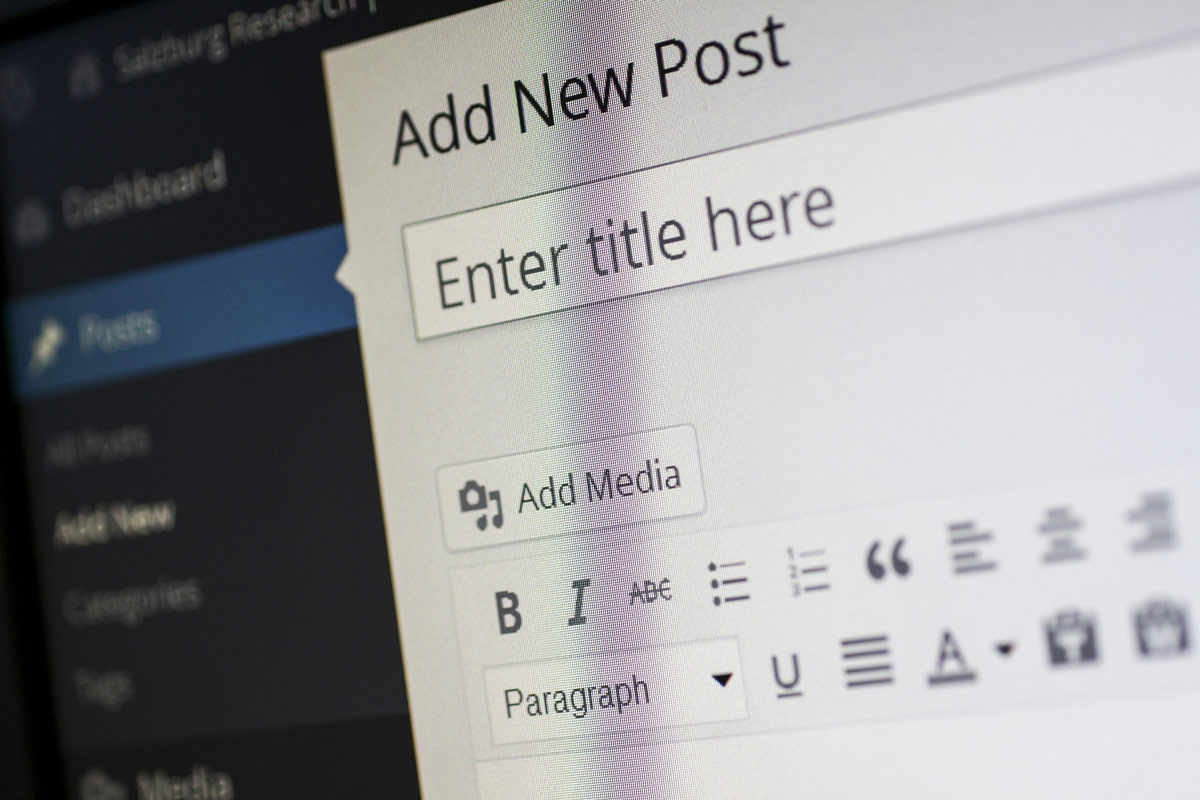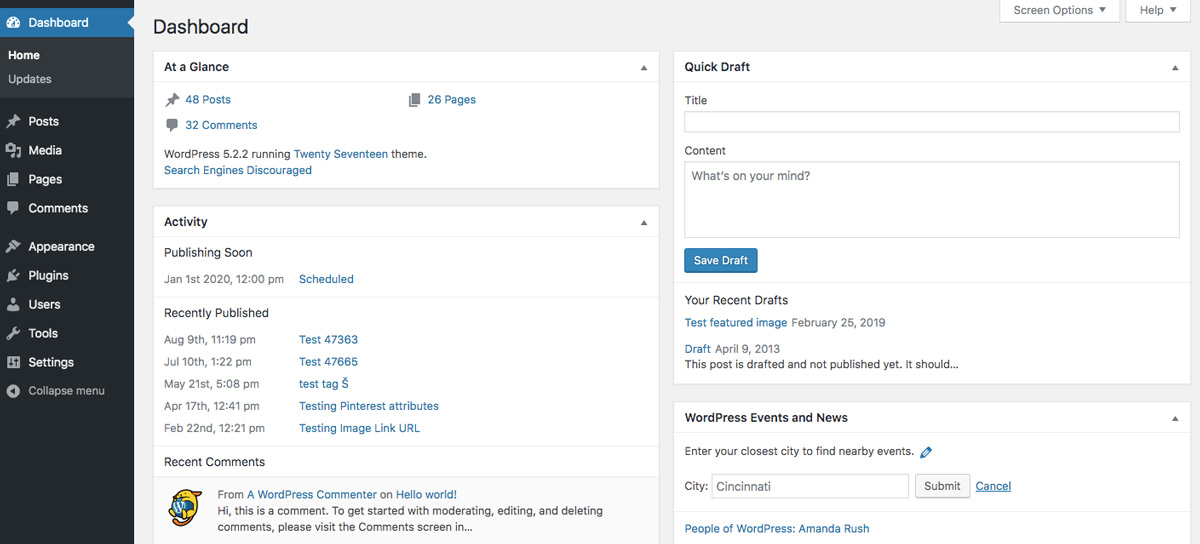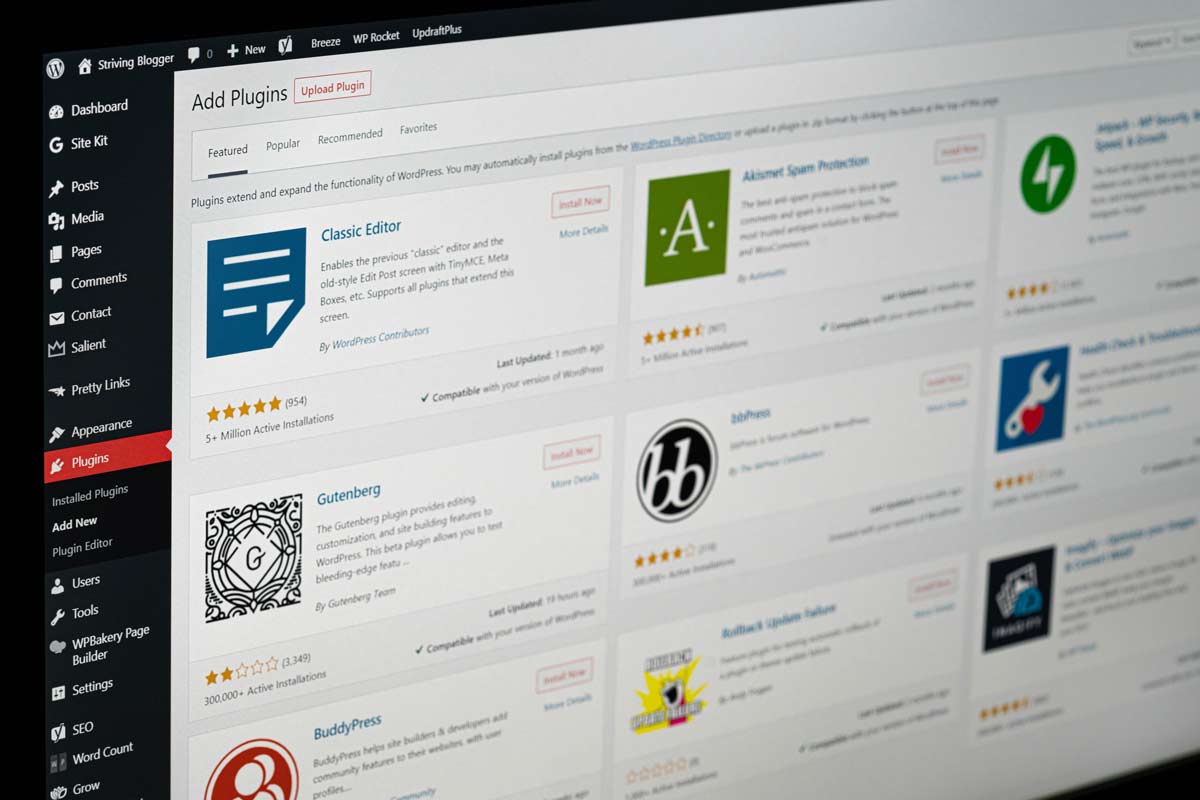Do you want to build a website for yourself or a client? Creating a new website is a challenging process in any case. For instance, you want to create something your clients would like, but you don’t want the design process to be lengthy or too complex. And if you want to build a website for your business, you’ll want to make it as perfect as possible, setting it apart from the thousands of other existing websites.
You’ve undoubtedly found WordPress in your search as a potential tool to ease the process. There is only one problem: you have no idea what WordPress is or how it might benefit you. If so, you have come to the correct spot.
This article will cover everything about WordPress, starting with the foundations and moving on to learning strategies. We will also present free WordPress lessons and courses so you can learn how to maximize the potential of this platform.
WordPress Explained
WordPress is a free, open-source platform that you can use to build your own website. WordPress is a PHP-based Content Management System, also known as CMS. Currently, the simplest and most effective website builder on the market is WordPress, which is much more generalized.
WordPress is a great platform for creating a variety of websites. It is a flexible CMS that you can use to create business websites, portfolios, and e-commerce sites (more on this later). This platform is a fantastic option for both big and small websites since it was created with a focus on usability and flexibility.
What Was WordPress’s Starting Point?
WordPress began with an original concept from a regular person trying to find a solution to a problem he faced back then.
It was 2002 in this instance. College student Matt Mullenweg installed the b2 or cafelog blogging platform for his usage at the time. Due to unfortunate personal reasons, the original inventor of b2/cafelog had to stop maintaining his invention.
With the aid of Mike Little, Matt modified the original b2/cafelog system on April 1st, 2003, to produce his version. Matt then built a new branch of b2 on SourceForge. Christine Tremoulet, a friend of Matt’s, suggested naming it WordPress.
On May 27th, 2003, WordPress 0.7, the initial version, was launched. In January 2004, WordPress 1.0 was published. This version was the first to resemble the WordPress we know today. The software was a complete blogging system with search engine-friendly permalinks, many categories, easy installations, update possibilities, and comment moderation.
WordPress was fortunate to benefit from Movable Type, a rival, changing their pricing policy in the same year. Many Movable Type users left because of this modification. The greatest option while looking for an alternative was WordPress.
And at that point, WordPress started to draw attention, and the project started to take off. With several years of improvements, the platform has become what we see today, powering over 40% of all websites.
WordPress Components
The fundamental building blocks of a WordPress site are a defined collection of items on every WordPress site. Once you understand what each one does, utilizing the platform is simple and enjoyable. In this article section, we’ll walk you through the essential elements of a WordPress website.
Posts

WordPress relies heavily on posts, which produce numerous kinds of content. They are frequently applied to blogs, where each new post denotes an update. Posts may also be used for regularly scheduled or timely material, including news stories, picture galleries, etc.
You’ll make a post using the WordPress editor. The vast majority of the choices are self-explanatory. As a result, working with WordPress is simpler than working with other platforms. Additionally, you can conduct bulk actions on several posts, which comes in handy after adding dozens or hundreds of posts.
Pages
WordPress pages and posts are quite similar in many respects. They may include the same material and are generated and changed using the same interface.
The primary distinction is how they are applied on your website. The main purpose of pages is to store more timeless, unchanging material that is unlikely to change frequently. For instance, you might use a post to share a news item or story. In contrast, the content should be a page if it provides static information about your business or one of your offerings.
Additionally, pages are what give your website its structure. As a result, you must have at least one, typically a home page or an archive of blog posts. Nevertheless, you may add as many pages as you like, depending on the goal of your website. A few typical examples are an About Us page with details about your business or group, a page with your privacy statement, and a Contact page where users may contact you.
Admin Dashboard

You’ll grow extremely used to the admin interface as you use WordPress. This is the interface you use to control every element of your website, from adding new features to changing the look and feel of your pages.
The Dashboard page, which offers quick access to important parts of the admin interface, will be visible when you first sign in. Each dashboard tab is dedicated to a vital component of your website and is divided into several sections.
Plugins

Plugins are among the main popular factors that make WordPress the most widely used website creation platform worldwide. A WordPress plugin is a small software you can easily install on your website. It allows you to expand your website’s capability without needing any technological expertise.
The flexibility of plugins makes them excellent for a variety of tasks. Some plugins give your website a few tiny new functions. But some plugins have a significant impact on your website. Here is a list of popular plugins you should have on your website:
Themes

WordPress themes help you personalize the look of your website. You might think of them as the “skin” of your website, which controls how visitors see your content. WordPress has a handful of default themes for novices, but you’ll want something more unique.
Fortunately, you can download many free WordPress themes directly from your dashboard. There are many of them accessible.
Media Library
Although the text is a necessary component of every website, you should add other media. Although images are most frequently uploaded, you could also want to contribute music, video, or documents. A post with several vibrant and relevant photos and videos will engage readers and appeal to them more than one with only plain text. To help readers comprehend what you are talking about in the text visually, you may easily add some images or videos to your content.
After that, you may use the media you’ve added to your library in your posts. You may reuse your files later by keeping them all in one location and organized in the library.
Categories
A category is used in WordPress to categorize and arrange content, making it simpler for users to explore your website. There are both wide and narrow categories. For instance, a category for news posts may contain subcategories for business news, industry news, and event news.
Each category you add will instantly produce a page that lists all the posts that are associated with it. As a result, a post’s content with the assigned cooking recipe category will show up at https://name.com/category/cooking-recipe.
Tags
Categories and tags have many similarities. Although their usage is significantly different, they are similarly intended to classify material and keep your website organized. Tags are significantly more precise than categories, which usually represent the sort of material or the overall subject matter of a post.
To identify topics and terms relevant to an article, utilize tags. Let’s take the case where you wrote a piece titled How took a specific dish. You may classify this in a cooking or tutorial category. After that, you may tag it with various descriptive terms, like food, cooking, recipe, and dessert.
The database
Every website, including WordPress, needs a database to store its information. Your website’s items and content, including articles, pages, comments, tags, categories, and much more, are stored in your database.
Although your site’s database may be its most important component, you can’t normally control it directly from the admin panel. Most users don’t even need to care about the database until there’s an issue with it or they’re developing their WordPress plugin.
The best approach to encourage direct interaction between visitors and your content is through comments. Although it is often deactivated on pages, this functionality is enabled by default on posts.
You might want to control your comments area, though. After all, some comments could be malicious in some form or generated by automated spam bots. You may control visitor messages on the comments screen to handle this.
In addition, you may flag comments as spam. Future similar posts will be automatically filtered out, thanks to this.
You can also decide to hold each comment until it has been moderated before posting, preventing potentially damaging or abusive comments from being displayed on your website. You can do this to review and approve comments before they are posted.
WordPress Features
WordPress has a broad feature set as a platform for creating websites and a content management system. Numerous characteristics set this platform apart from others. The distinctive aspects of WordPress are listed below.
SEO

WordPress is a platform that enhances SEO. Technical SEO (Search Engine Optimization) is where website ranking starts, and WordPress offers an excellent coding basis for SEO.
WordPress websites are the best for Google indexing since their codes are straightforward and consistent. You may employ various features to get your website good search rankings. Selecting SEO Hosting for your website will be a smart move if you’re constructing it in an SEO-friendly manner. SEO does aid in the expansion of your local firm. Here is what you need to know about SEO hosting and how it affects your website’s rating.
Further optimizations can be done using various free WordPress plugins for SEO.
Flexibility
You may build any website using the WordPress platform, including personal blogs, corporate blogs, photoblogs, travel blogs, news sites, etc. With WordPress, you can pick from over a thousand plugins and themes to improve the look and feel of your website. You may set up plugins in a matter of minutes.
Convenient interface
You may quickly and easily install and set up a WordPress site without any technological expertise. You can quickly set up a blog and easily maintain and edit your websites here. Your content management is made simple with WordPress. You may schedule and post your blogs here as you choose. You have also chosen whether to make your material public or private and password-protect your posts and pages.
Easy media management
You may pick from and quickly upload photos and movies in the WordPress media library. It improves the depth of the material on your website. Drag the media content from your device and drop it into the uploader to have it posted if you want to add content or photographs. Audio, video, picture, and document media files may be dropped, dragged, filtered, ordered, and customized. Install the media management plugin if you wish to arrange your items in your media library quickly.
Customizable
WordPress includes a variety of built-in themes that let you construct personal and professional blogs based on your needs. Just click the icon to submit your theme. Making your website from scratch will take a few minutes.
The procedure moves quickly and effectively. You may create a new WordPress webpage and publish the content whenever you like. Using the built-in dashboard, you may create a new post, page, theme, and much more. WordPress runs in a browser. As a result, you can quickly administer your site by logging in from any internet-connected device.
Why Should I Use WordPress to Build My Website?
Many of the most well-known companies, like Time Magazine, Facebook, Sony, Disney, Target, and The New York Times, rely on WordPress to power their websites because of its extensive feature set. Why, therefore, should you employ it?
The unique features of this platform and its cost are the two main causes. The first one has already been discussed in great depth. So now, let’s speak about the cost. WordPress is free software. It implies that you can download, set up, use, and alter it as necessary to suit your needs. You may make any website with it.
WordPress software is generally free, but you need a domain name and web hosting to install it. A domain name gives your website its online address. To reach your website, your users put this into the address bar of their browsers. The place where all of your website’s content and files are kept is called web hosting. The domain and web hosting may cost you money, but it isn’t much to worry about.
WordPress Tutorials
Where should you start if you have no prior experience? It could not be easy to start using WordPress without basic knowledge.
That is why, as promised, we have produced a comprehensive collection of WordPress tutorials and courses.
What Kinds of Websites Can I Build Using WordPress?
When it comes to personalizing a WordPress website, the options are virtually limitless. WordPress plugins and themes can increase functionality and introduce additional design possibilities. Here are some examples of what websites you can make using WordPress:
- Blog: A blog is a website where people may post ideas, pictures, reviews, instructions, recipes, and much more. In blogs, the most current content is often shown first.
- E-commerce website: With the help of an e-commerce website, you may offer your services online and receive money using a secure online payment method. To expand WordPress’s built-in functionality and enable an online store on your website, you may download and install an e-commerce plugin.
- Business website: Their websites will provide many firms with an internet presence. WordPress is a great choice if your company requires a website so clients can learn more about you and what you offer.
- Membership website: A membership website enables you to hide information behind a paywall or a login process. Users must log in or purchase the material to view pages or posts. With extra plugins, WordPress can also manage membership websites.
- Portfolio: With a WordPress-built website portfolio, you may showcase your creative work, design abilities, and more.
- Forum: A forum website might benefit people who want to exchange tips or inquire. WordPress shockingly fuels a large number of discussion websites.
- Event website: You may easily sell tickets and easily distribute information about your event using WordPress.
- E-learning website: From an e-learning website, students may take online courses, monitor their progress, download resources, and do much more. You may provide online courses from a WordPress website using a certain sort of plugin called a WordPress LMS plugin.
- Wedding website: With a WordPress-powered wedding website, you can share your special day’s details. You may easily and quickly launch a website using a variety of WordPress wedding themes.
Final Thoughts About WordPress
WordPress is the most used platform (43 percent out of all platforms) for creating websites for a reason. It is a fantastic alternative for creating any website, from a blog to an online store.
WordPress has spawned new industries. Today, WordPress has incredible ways to make money, including constructing websites for customers, operating an online store, and WordPress consulting.
After learning about this platform, you can start your own business or design a new website.
Remember that repetition leads to perfection. Before you can get things correct, you might need to go through some trial and error. But there is a way to achieve perfection when there is ambition.
Was this article helpful?
YesNo